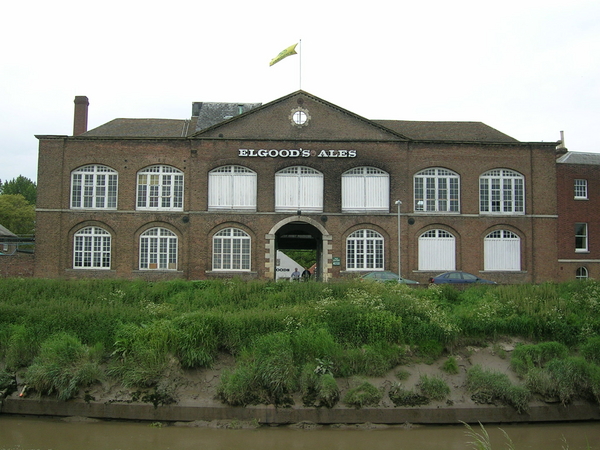Three sisters are keeping their Fenland family brewery safe for the future
Added: Friday, June 1st 2012

It’s always good to find a family brewery where the family is still firmly in charge and not just a name on the letterhead. At Elgood’s in Wisbech, you can’t move for family members. I was greeted by chairman Nigel Elgood and his wife Anne, and they were followed by their three remarkable daughters.
Belinda Sutton (centre in photo) is the managing director, Jennifer Everall (on the right) is the company secretary while Claire Simpson is a director and also a landscape gardener. Claire not only runs a visitor centre but has also used her skills to refashion the gardens that make Elgood’s a rare attraction: a traditional brewery with four acres that include lawns, a maze, ancient oaks, a lake, herb garden, herbaceous borders and a rockery.
Elgood’s is a Georgian brewery, its handsome facade standing proudly on the banks of the River Nene in the Cambridgeshire town that’s at the heart of the bleak yet strangely beautiful Fenlands.
The site dates from 1682, it became a granary in 1714 and was converted into a brewery in 1786. By the time the Elgood family took over in 1877, the brewery had acquired six public houses of which the Hare & Hounds, the Spread Eagle and the Queen’s Head survive to this day.
A long and fascinating history is no guarantee of survival. Belinda Sutton is refreshingly open about the problems faced by a small family brewery that has been bruised and battered by the modern world. Elgood’s, on the border with Norfolk, faces aggressive regionals such as Greene King and Adnams on one side and the new wave of micros on the other.
Elgood’s brews just 8,000 barrels a year, a figure that makes the company smaller than many micros. That production level enabled Elgood’s to make a comfortable living when it supplied 80% of its beer to 42 tied houses. But times have changed. The number of pubs has declined to 36 and the family took the hard decision to close five last year.
Many outlets are in tiny, isolated Fenland hamlets, where people have lost the habit of going to the pub. When Elgood’s announced it was closing one particular pub, the brewery received an angry letter from the local vicar. When he was asked how often he went to the pub, he said he never went – but he was still extremely angry. Other villagers use pubs once or twice a year, often just at Christmas and New Year, and spend the rest of the time drinking at home.
Elgood’s could have stood back and watched the slow decline of the company until it became unviable. But the Elgood sisters are made of sterner stuff and they are determined to hand on the brewery to their children.
Today, only 35% of annual production goes to the brewery’s pubs, and the sisters have embarked on a survival course. Bottled beers are on sale in Asda, Morrisons, Tesco and Waitrose in eastern England along with the East Anglian chain of Roy’s of Wroxham. The company has taken on Helen Timperley as a sales consultant to build supermarket sales.
The brewery is also attacking the export market. It has developed Black Eagle Imperial Stout, a 7% beer aimed at the American market and has also entered the French market via a specialist chain with the splendid name of Noz.
Elgood’s is not ignoring the pub trade. It has energetically attacked the free trade, especially in such key towns as Norwich and Peterborough, and it’s bought one of Norwich’s leading pubs, the Reindeer. The sisters are full of praise for local CAMRA – Campaign for Real Ale – branches that have put their support behind the brewery.
Its own estate receives much-needed investment. Belinda Sutton says that the income from exports has enabled her to plough £250,000 in to the Duck at Stanhoe, near Burnham Market. As well as the key brands, Black Dog Mild and Cambridge Bitter, the brewery has introduced a range of seasonal beers with “doggy” names that emphasise the company’s heraldic symbol of a greyhound with a key in its mouth. Such names as Cocker-less Four, Beach Collieball, 4xPaw and Three Dane Eventing may make you wince but they stand out on bars where Elgood’s competes for attention with micros.
Alan Pateman, the head brewer, runs a wonderfully traditional brewhouse with copper vessels and high-sided wooden fermenters. One of his first acts when he arrived 20 years ago was to add a mini-brewhouse for short-run beers, leaving the main vessels free for the two core brands. Black Dog has become a national brand at a time when few brewers can be bothered with mild ale, while Cambridge Bitter builds on the success of winning gold in its class in the 2006 Champion Beer of Britain competition.
One of the high spots of the brewery tour are the now redundant open copper cooling trays where the hopped wort used to be cooled prior to fermentation. They are identical to the “cool ships” used in Belgian lambic breweries, where brewers want the extract to be inoculated by wild yeasts. But Alan Pateman doesn’t make lambic and quickly dispensed with the trays when he took over. But they remain as a fascinating example of brewing practice from previous centuries.
Both brewery and gardens are open to visitors (www.elgoods-brewery.co.uk) until the end of September. They offer a splendid day out and the chance to see three sisters with a steely determination to carve out a sound future for their family brewery.
*Main photo of the sisters courtesy of Tim Hampson. An edited version of this article appeared in the Publican’s Morning Advertiser, 31 May 2012.





